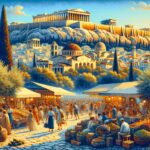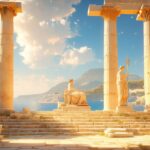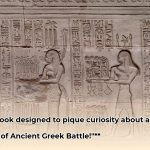Have you ever paused to consider the origins of concepts we now take for granted, such as democratic governance, foundational philosophical thought, or even the subtle nuances of language? From the bustling marketplaces of Athens to the formidable training grounds of Sparta, Ancient Greece was a crucible of innovation, a civilization whose astonishing legacy continues to resonate deeply within our modern world. Beyond the epic tales of gods, goddesses, and legendary heroes, lies a trove of surprising historical realities that reveal the true depth of its influence. Join us on an immersive journey to uncover these remarkable facts and understand their profound, lasting significance. One can learn more about Ancient Greece art here.
Delving into the Enduring Legacy of Ancient Greece
Ancient Greece, widely celebrated as the cradle of Western civilization, bequeathed an indelible mark on global society. Let’s unpack some truly unique and interesting facts about this pivotal era, illustrating the profound and lasting civilization legacy of the extraordinary Hellenic culture.
The Birthplace of Democracy, With Nuances
The revolutionary concept of Athenian democracy famously took root in the city-state of Athens around 508 BCE. Here, eligible adult male citizens directly participated in the governance of their city, deliberating and voting on laws and policies. Cleisthenes, often hailed as the “Father of Athenian Democracy,” was instrumental in reforming the political system, significantly broadening citizen involvement and giving more individuals a voice than ever before. This was an astonishing leap for its time.
However, a critical historical lens reveals that this early form of democracy had inherent limitations. It fundamentally excluded women, enslaved people, and non-Athenian born residents from political participation. This vital detail serves as a powerful reminder that even the most groundbreaking societal structures can emerge with pronounced imperfections. The ongoing pursuit of inclusive governance remains a core challenge, echoing the initial steps taken in Ancient Athens.
Unexpected Daily Life Innovations
Beyond grand political ideals, Ancient Greeks pioneered surprisingly practical inventions and customs that might shock you:
- The First Vending Machine: Forget chocolate bars! The earliest known vending machine, devised by Hero of Alexandria in the 1st century CE, dispensed holy water in temples. A coin dropped by a worshipper activated a lever, allowing a measured amount of sacred water to flow, ensuring equitable distribution in the absence of a priest.
- Cheesecake for Champions: Long before modern bakeries, cheesecake was a staple in Ancient Greece. Made from flour, wheat, honey, and, of course, cheese, these delicacies were not just part of wedding traditions but were also given to competitors in the Olympic Games for energy – an ancient power bar!
- Stones as Toilet Paper: Yes, you read that correctly. Ancient Greeks commonly used smooth stones (pessoi) or fragments of ceramic (ostraka) for personal hygiene. While seemingly crude, it highlights resourceful adaptation to available materials.
- The Unibrow as a Beauty Standard: In a dramatic contrast to modern aesthetics, the unibrow was considered a symbol of beauty and intelligence for women in Ancient Greece. Those who didn’t naturally possess one would meticulously paint the gap between their eyebrows or even use animal hair affixed with tree resin to achieve the desired look.
- Diluting Wine was Civilized: Far from being a sign of weakness, drinking undiluted wine in Ancient Greece was considered barbaric and uncivilized, fit only for the god Dionysus. Greeks habitually mixed wine with water, typically in a 3:1 ratio, believing that undiluted wine led to violence and loss of control. This practice was a mark of sophistication and self-restraint during social gatherings called symposia.
Pillars of Enduring Philosophy
The intellectual giants Socrates, Plato, and Aristotle remain towering Greek philosophers whose ideas laid the very groundwork for modern logic, ethics, political science, and even early scientific inquiry. Socrates revolutionized inquiry with his Socratic method, persistently challenging conventional wisdom through dialogue and critical questioning. Plato, his most famous student, explored profound concepts of justice, ideal governance, and the nature of reality in works like “The Republic,” founding the Academy in Athens, one of the earliest institutions of higher learning. Aristotle, a polymath and student of Plato, meticulously delved into nearly every field of human knowledge, from biology and physics to rhetoric and poetics, significantly shaping Western thought.
Their profound and lasting impact underscores the timeless importance of rigorous critical thinking, ethical reasoning, and the pursuit of knowledge. Their questions continue to provoke and inspire, demonstrating the enduring power of inquiry.
Architectural Marvels in Stone
The Parthenon, with its majestic Doric columns and intricate sculptures dedicated to the goddess Athena, stands as a supreme example of the architectural genius of the ancient Greeks. This iconic structure embodies principles of proportion, harmony, and balance that continue to inspire architects globally. Its enduring appeal lies in its mathematical precision and aesthetic perfection, visible in the subtle optical corrections like entasis (slight bulging of columns) that make the building appear perfectly straight to the eye.
Greek architecture introduced three distinct column styles:
* Doric: Simple, sturdy, and unadorned, reflecting strength and austerity.
* Ionic: More slender with volutes (scroll-like ornaments) at the capital, conveying elegance.
* Corinthian: The most ornate, featuring elaborate acanthus leaf decorations, signifying grandeur and luxury.
These styles became fundamental elements of classical art and design, profoundly influencing architecture from the Roman Empire to the Renaissance and beyond, shaping much of our ancient architecture and contemporary design.
The Genesis of the Olympic Games: A Truce for Excellence
The original Olympic Games commenced in 776 BCE in Olympia, conceived as a grand festival dedicated to honoring Zeus and fostering unity among the often-conflicting Greek city-states. These games famously included a sacred truce (ekecheiria), a period of cessation of all hostilities, allowing athletes and spectators to travel safely to and from Olympia. This commitment to peace for the sake of competition is a powerful testament to their values.
These were far more than mere athletic contests; they embodied a deeply spiritual and religious experience. Initially, participation was exclusively limited to freeborn Greek males. Competitions encompassed a wide range of events, including various footraces (like the stadion, a sprint of about 200 meters), wrestling, the pentathlon (discus, javelin, long jump, wrestling, and a sprint), boxing, thrilling chariot racing, and the brutal pankration (a no-holds-barred combat sport combining wrestling and boxing). It’s a striking historical fact that many athletes competed in the nude, celebrating the perfection of the human form. The ultimate prize for victors was not glittering gold medals, but simple yet profoundly symbolic wreaths of olive leaves, signifying honor and civic pride.
A Complex Historical Narrative: Shadows and Light
It is crucial to acknowledge that ancient Greek civilization included significant societal injustices, not solely glorious achievements. Slavery was widespread, with estimates suggesting that 40-80% of Athens’ population were enslaved individuals, providing the labor that underpinned much of their societal and economic structure. Women, though their roles varied by city-state (Spartan women, for instance, enjoyed more freedoms), generally faced significant restrictions, with limited participation in public life and often confined to domestic roles.
Furthermore, the constant internecine conflicts between powerful city-states, such as the relentless rivalries between Athens and Sparta (culminating in the Peloponnesian War), were a persistent and often devastating reality. Understanding these complex facets—the brilliance alongside the pronounced injustices—is crucial for a complete and nuanced historical perspective. How do we reconcile their profound accomplishments with such pronounced societal inequalities? This question compels us to confront ongoing debates about social justice and equality, which remain highly relevant.
The Evolution of “Idiot”: A Civic Warning
Here’s one of the more linguistically interesting facts Ancient Greece offers: the term “idiot” originates from ancient Greek. In ancient Athens, an “idiotes” (ἰδιώτης) referred to a private citizen who refrained from engaging in public life or political affairs. It wasn’t necessarily an insult implying low intelligence, but rather a descriptive term for someone who was self-centered and disinterested in the common good—a stark contrast to their emphasis on active civic engagement and public duty.
Naturally, today, labeling someone an “idiot” carries a distinctly negative connotation. Yet, the original meaning prompts a critical reflection: Are we, in our modern detachment from community issues and political discourse, inadvertently becoming our own version of “idiotes”? It’s certainly something to ponder, isn’t it?
The Unknown Deity: A Precautionary Belief
The ancient Greeks, renowned for their vast pantheon of gods and goddesses, occasionally dedicated altars to the “Unknown God” (Agnostos Theos). This practice stemmed from a profound fear of inadvertently overlooking a deity in their elaborate religious system, which might provoke its divine wrath. By acknowledging an unknown god, they sought to ensure comprehensive reverence and avoid any potential divine retribution.
This historical detail makes one consider: How many elements in our contemporary lives are influenced by forces or factors we don’t yet fully comprehend, and how do we respond to the unknown?
Innovations in Warfare: From Phalanx to Trireme
Beyond their roles as intellectual dreamers and artistic innovators, the Greeks were formidable architects of military strategy and technology, leaving an enduring imprint on the art of war.
- The Phalanx: This revolutionary infantry formation transformed ancient warfare. Greek hoplites (heavily armed infantrymen) arranged themselves in a tightly packed rectangle with overlapping shields and long spears (dory), forming an almost impenetrable defensive and offensive wall. The discipline and collective strength of the phalanx made it incredibly effective against less organized enemies.
- Naval Warfare and the Trireme: The trireme, a sleek and swift warship, represented another significant Greek invention that dominated ancient naval battles. Driven by three banks of oarsmen (hence “tri-reme”) and propelled by a single sail, these vessels were designed for unparalleled speed and maneuverability. Their primary tactic was ramming and disabling enemy ships with a bronze-clad prow, showcasing advanced ancient naval tactics and contributing significantly to Greek victories like the Battle of Salamis.
The Genesis of Theater: A Universal Stage
The ancient Greeks gifted the world the art of theater, a profound medium for exploring human experience. Tragedies and comedies were performed in magnificent open-air amphitheaters, where playwrights explored universal themes of love, loss, justice, fate, and the profound complexities of the human condition. Renowned playwrights such as Aeschylus (e.g., “The Oresteia”), Sophocles (e.g., “Oedipus Rex”), and Euripides (e.g., “Medea”) created works that resonate even today, with their timeless stories continually reinterpreted and performed across cultures. Comedy, spearheaded by figures like Aristophanes (e.g., “Lysistrata”), offered satirical critiques of society and politics, proving that humor and social commentary have deep historical roots. This enduring cultural legacy highlights the power of Greek theater to address universal human experiences and remains a foundational element of dramatic arts worldwide.
Greece’s Naming: From Hellas to Greece
An interesting linguistic fact that often surprises people is that Ancient Greece wasn’t actually called “Greece” by its inhabitants. The Greeks referred to their land as Hellas or Hellada, and its people as Hellenes. The modern official name remains the Hellenic Republic. The word “Greece” originated from the Romans, who derived it from the Latin word “Graecia,” literally meaning “land of the Greeks,” after encountering a tribe called the Graeci. This linguistic shift reflects the Roman influence that later dominated the region.
The Brilliance of Alexander the Great
Though Macedonian, Alexander the Great was raised and tutored by the Greek philosopher Aristotle, deeply absorbing Hellenic culture and military strategy. He became arguably the greatest military leader of all time, responsible for forging one of the most expansive empires in history. His conquests spread Greek language, culture, and ideas across vast territories from Greece to Egypt and India, catalyzing the Hellenistic Age, a period of immense cultural exchange and intellectual achievement. His military genius and cultural impact remain subjects of intense study.
The Father of Medicine: Hippocrates
Hailing from Ancient Greece, Hippocrates is universally revered as the “Father of Medicine.” He revolutionized medical practice by moving it away from religious superstition and towards rational observation and empirical study. He is credited with establishing a systematic approach to diagnosis and treatment and is associated with the Hippocratic Oath, an ethical code for physicians that continues to influence medical ethics to this day. His famous saying, “Let food be thy medicine and medicine be thy food,” underscores his holistic approach to health.
The Immortal Epics of Homer
Homer, quite possibly the greatest poet to have ever lived, shaped Western literature with his epic poems, “The Iliad” and “The Odyssey.” These foundational texts, chronicling the Trojan War and Odysseus’s arduous journey home, are as influential today as they were thousands of years ago. They are not merely stories; they are profound explorations of human nature, heroism, fate, and morality, providing rich insights into ancient Greek values and beliefs.
In summary, the incredible ancient Greek civilization continues to shape our lives in countless profound ways. By exploring these interesting facts and understanding the triumphs and struggles that Ancient Greece has unveiled, we gain invaluable actionable insights for comprehending our past and fostering a more informed, critical, and engaged future.
Athens’ Ostracism: Unveiling a Unique Political Practice
Key Takeaways:
- Ostracism was an Athenian democratic procedure designed to neutralize potential threats to the state and resolve political impasses.
- It involved temporarily banishing a citizen for ten years, crucially without confiscating their property or revoking their citizenship.
- The process utilized pottery shards (ostraka) for voting, requiring a quorum of 6,000 citizens to be valid, emphasizing collective will.
- Introduced by Cleisthenes, ostracism evolved from preventing tyranny to managing significant policy disputes and political rivalries.
- The practice eventually declined due to increased manipulation and partisan abuse, highlighting the fragility of even well-intentioned systems.
The Genesis of Ostracism: A Pressure Valve for the State
How many historical societies do you know that empowered citizens to vote an individual out of town? Ancient Athens, ever innovative in its Athenian democracy, implemented ostracism as a key component of Cleisthenes’ democratic reforms around 508 BCE. Consider it a sophisticated political pressure valve—a mechanism designed to safeguard the nascent Greek city-state from potential tyrants or disruptive figures. But how exactly did this seemingly peculiar practice work in detail? Though it might sound like something from a modern dystopian novel, it was a very real, procedurally defined mechanism intended to protect the stability and harmony of Athenian society.
Casting the Vote: The Significance of Ostraka and Quorum
Imagine the scene in the Athenian Agora: citizens gathered annually, not with modern paper ballots, but with shards of pottery—called ostraka (singular: ostrakon). Each individual carefully scratched onto a shard the name of the person they believed posed a significant threat to Athens’ stability, or whose influence had grown too great. It was, in essence, a direct public vote with extraordinarily high stakes for the nominated individual.
However, a crucial safeguard was in place to prevent frivolous or politically motivated banishments: a minimum of 6,000 votes (a quorum) were required to validate an ostracism. This stringent requirement firmly emphasized its roots in the collective, broadly supported will of the people, ensuring that ostracism was a serious and deliberate act of the Athenian citizenry, as detailed in comprehensive historical accounts, including the well-referenced Wikipedia entry on Ostracism.
The Ten-Year Timeout: Banishment, Not Ruin
If a citizen received sufficient votes, they were formally banished from Athens for a period of ten years. While this might sound harsh, it is vital to understand the specifics of this “punishment.” It was explicitly not a permanent exile. Crucially, their property remained untouched, and their status as a citizen was entirely preserved, ready to be reinstated upon their return. It functioned more as a “time-out” or a “cooling-off period,” allowing political tensions to subside and the political landscape to shift without permanent damage or financial ruin to the individual’s standing. This temporary nature distinguishes it from outright exile or capital punishment.
Why Ostracize? Evolving Purposes and Notable Cases
Initially, ostracism served as a crucial tool to prevent the resurgence of tyranny, a specter that haunted Athens after the rule of figures like Peisistratus. Over time, however, its purpose subtly morphed. It became a mechanism to resolve deep-seated policy disagreements, political impasses, or even intense rivalries between powerful leaders. For example, prominent figures like Themistocles, the brilliant strategist of the Persian Wars, and Aristides the Just, known for his integrity, were both ostracized. One might wonder, was it also, at times, used as an outlet for personal grudges or petty rivalries? Given the enduring nature of human political behavior, historical evidence suggests this became increasingly probable in later periods.
The Downfall: Manipulation and Abuse of Power
Ultimately, the practice of ostracism fell out of favor and was eventually abandoned around 417 BCE. Why? Like any powerful political instrument, it proved susceptible to misuse and manipulation. Powerful political figures or factions could collude or manipulate the process, transforming it from a safeguard against tyranny into a means to settle scores, eliminate political rivals, or consolidate power. Such inherent vulnerability to exploitation is often the “Achilles’ heel” of even the most well-intentioned systems, demonstrating that the integrity of a political process relies heavily on the intent of its actors.
Ostracism: Pros & Cons Re-evaluated
| Pros | Cons |
|---|---|
| Prevents Tyranny: An effective, non-violent means to remove an overly powerful or ambitious individual who threatened democratic institutions. | Subject to Manipulation: Could be unfairly used by political factions or demagogues to target ideological opponents. |
| Resolves Political Impasses: Offered a structured, constitutional way to break deadlocks and reduce acute civic tension without civil war. | Potential for Abuse: Personal grievances, envy, or petty rivalries could influence voting outcomes, leading to unjust banishments. |
| Non-Permanent: Banishment was temporary, preserving citizenship and property rights, allowing for eventual reintegration. | Undermined Stability: Could inadvertently create instability or weaken the state by removing experienced or vital leaders, even temporarily. |
| A Safety Valve: Allowed the release of popular discontent and public anxiety through a structured, non-violent method of political purification. | Inconsistent Application: Might not be applied consistently or fairly across different individuals or situations, leading to perceived injustice. |
Echoes in Modern Society: A Timeless Impulse?
Ostracism might seem like a mere ancient oddity, yet are there not striking echoes of its underlying impulse in today’s world? Consider contemporary phenomena like “cancel culture,” public shaming, or even the established mechanism of recall elections. While vastly different in their execution and scale, are these not contemporary manifestations of a similar societal impulse: to remove an individual from a position of public power or influence when their actions are deemed detrimental or threatening to collective values? It certainly provides compelling food for thought regarding the enduring human desire to regulate public figures and ensure communal well-being, doesn’t it?
How the Olympic Games Originated in Ancient Greece
Key Takeaways:
- The ancient Olympics commenced in 776 BCE as a significant quadrennial religious and athletic festival honoring the god Zeus.
- Held every four years in Olympia for over a millennium, these Games were paramount in shaping Greek national identity and fostering Hellenic culture.
- Initially, participation was strictly restricted to freeborn Greek males, who often competed nude.
- Winners received a prestigious wreath of olive leaves, symbolizing honor and ultimate triumph, rather than material wealth.
- The Games saw a gradual decline under Roman rule and were eventually banned by Emperor Theodosius I in 393 CE due to their pagan associations.
- The modern Olympics were magnificently revived in 1896 by Pierre de Coubertin, directly inspired by these ancient Olympic ideals of athletic excellence, peace, and international camaraderie.
The ancient Olympic Games, a quadrennial athletic and religious festival held in Olympia, Greece, from 776 BCE to approximately 393 CE, held profound significance in shaping Greek identity, culture, and athletic ideals. Its enduring cultural legacy continues to inspire the modern Olympic movement. Have you ever wondered how the Olympic Games originated in Ancient Greece and what their true, multifaceted purpose was beyond mere competition? Let’s delve into this fascinating and deeply impactful historical narrative.
A Sacred Festival for Zeus and Pan-Hellenic Unity
Imagine the vibrant panorama of ancient Greece: a landscape of often-conflicting Greek city-states, each fiercely independent. Yet, remarkably, every four years, a sacred truce (ekecheiria) was formally declared and rigorously respected across the entire Greek world. The overarching purpose? To honor Zeus, the king of the gods, through the grand spectacle of the Olympic Games!
These were far more than simple athletic contests; they embodied a deeply spiritual, religious, and political experience. The truce allowed athletes and spectators to travel safely to Olympia, transforming the event into a powerful symbol of pan-Hellenic unity, however temporary. Initially, participation was exclusively limited to freeborn Greek males, who underwent rigorous training. Competitions encompassed a wide range of events, including various footraces (like the stadion, diaulos, and dolichos), wrestling, the pentathlon (a set of five events including discus, javelin, long jump, wrestling, and a short footrace), boxing, thrilling chariot racing (often the most popular and dangerous event), and the brutal pankration. Can you truly envision the raw intensity, dedication, and physical prowess of these ancient athletes, competing, famously, in the nude as a celebration of the human form and a testament to natural ability?
From Agōnes to Ludi: A Shift in Cultural Values
Why were the Olympics so profoundly significant to the ancient Greeks? They weren’t just games; they were agōnes—contests intrinsically focused on competition, the pursuit of individual excellence (aretē), and the honor of victory. The concept of “agon” permeated Greek life, from athletics to rhetoric and philosophy.
However, with the advent of Roman rule, a cultural shift occurred that gradually transformed these ideals. The Romans gravitated towards ludi—games primarily designed for public entertainment, spectacle, and often violent gladiatorial contests. This evolution starkly reflects the differing cultural values between the Greeks (focused on individual glory and civic honor) and the Romans (focused on entertainment, control, and imperial grandeur). The sacred truce and the profound competitive spirit of the original games gradually diminished as Rome’s influence broadened and as professional athletes replaced amateur competitors.
Nudity, Olive Wreaths, and Enduring Prestige
Have you ever considered the long-standing tradition of athletes competing in the nude during the ancient Olympics? Theories abound, ranging from religious symbolism (emulating gods or heroes) and a means of social differentiation (only free citizens competed) to a celebration of the human form and its physical perfection, and even practical reasons (less clothing meant less impediment). It was a tradition deeply embedded in their cultural ethos.
And the ultimate prize? Not glistening gold medals, or vast sums of money, but simple yet profoundly symbolic wreaths of olive leaves from a sacred tree in Olympia. Victors, known as olympionikai, returned home to widespread public recognition, immense civic pride,
















